The ketogenic diet can be defined as a nutrition plan that switches the body’s fuel source from carbohydrates to fats. This change leads to a metabolic state called ketosis, where the body becomes incredibly efficient at burning fat for energy.
Weight loss is a prominent benefit that draws many to this high-fat, low-carb lifestyle. However, the type of fat one consumes on a keto diet matters greatly. It’s essential to focus on healthy fats that support the body’s overall well-being while aiding in weight loss.
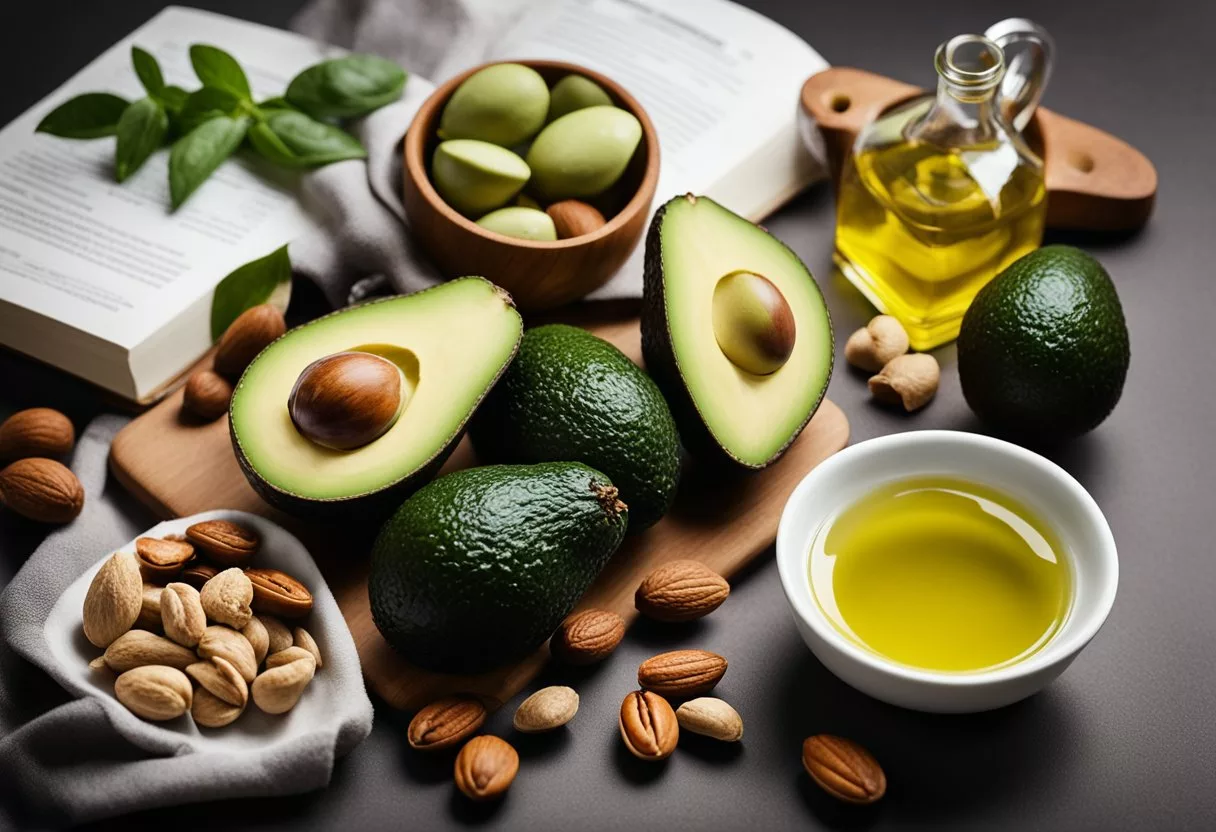
Healthy fats are a cornerstone of the ketogenic diet, providing the majority of daily caloric intake. They play a critical role not only in inducing ketosis but also in ensuring that the dietary shift does not compromise one’s health. Sources of such fats include avocados, olive oil, and certain nuts and seeds, known to offer a wide array of health benefits. These fats are dense in energy, support brain function, and can help maintain healthy cholesterol levels.
Incorporating these nutritious sources of fats into a ketogenic lifestyle is not merely about adhering to macronutrient ratios for the sake of losing weight, but is also about ensuring optimal nutrition. With its emphasis on high-quality fat consumption, the ketogenic diet is more than just a pathway to weight loss—it’s a comprehensive approach to a healthier lifestyle. By choosing the right fats, those following a ketogenic diet ensure their meals are not only macro-nutrient appropriate but also nutrient-rich.
Understanding Ketogenic Diets
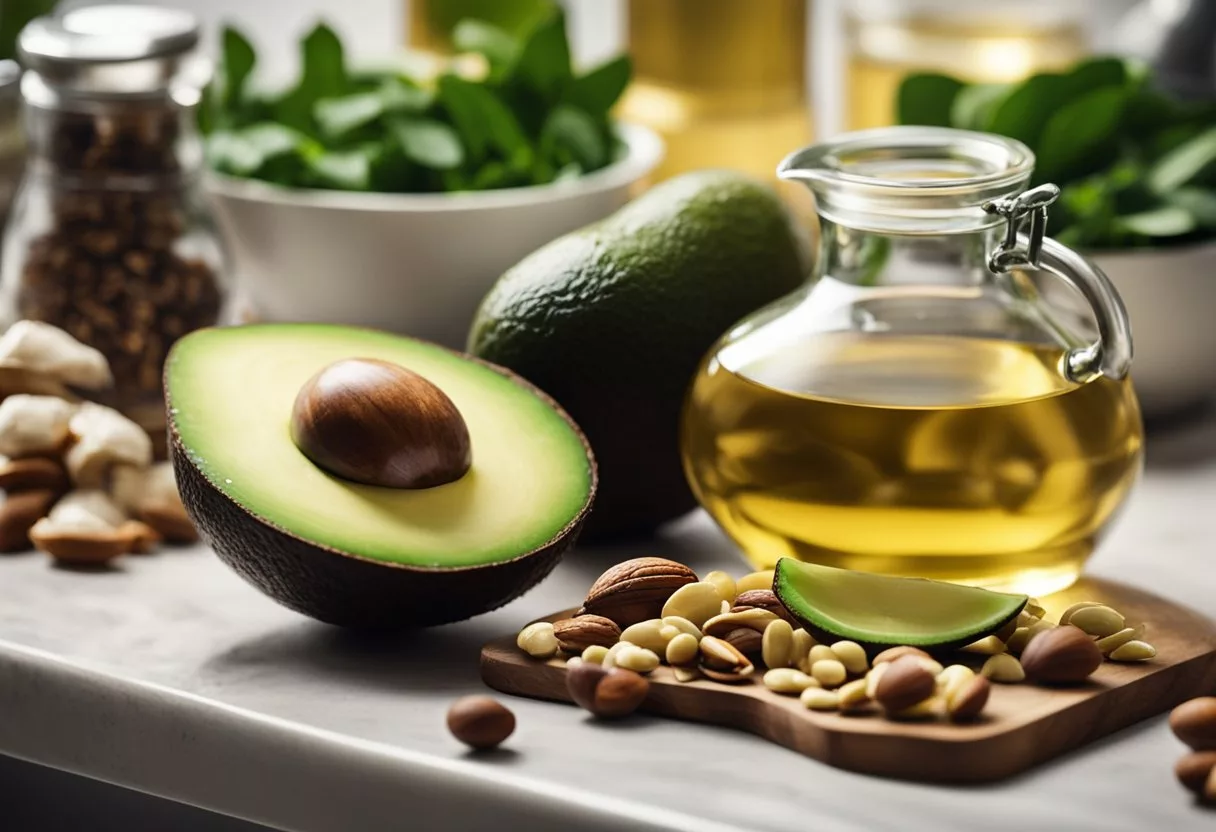
The ketogenic diet revolves around the metabolic state of ketosis, where the body utilizes fat for fuel due to a low intake of carbs. It offers potential benefits for weight loss and glycemic control.
Principles of Keto
The ketogenic diet is characterized by its high fat and low-carb framework. This diet’s primary goal is to achieve ketosis, a metabolic state where the body burns fat for energy instead of glucose. Typically, 20 to 50 grams of carbohydrates per day is the threshold for most individuals to remain in ketosis.
- Macronutrient Ratios:
- 70-80% Calories from Fat
- 10-20% Calories from Protein
- 5-10% Calories from Carbohydrates
Benefits of a Low-Carb, High-Fat Diet
Implementing a ketogenic diet can lead to several health advantages:
- Weight Loss: By burning fat for energy, the body may shed excess weight more efficiently.
- Blood Sugar: A ketogenic diet can help stabilize blood sugar levels, thus aiding individuals with diabetes.
- Heart Health: Quality fats can lead to improved heart health when they replace certain carbohydrates.
- Diabetes Management: Thanks to its effects on insulin sensitivity, the diet can be beneficial for those managing type 2 diabetes.
- Inflammation: The diet may decrease inflammation, potentially benefiting overall health and conditions like arthritis.
- Brain Health: Ketosis provides a consistent fuel source that can support cognitive functions and brain health.
The shift in energy sourcing from carbohydrates to fats puts one’s body in a state of ketosis, leading to changes in energy metabolism which can result in various health benefits.
Roles and Types of Fats
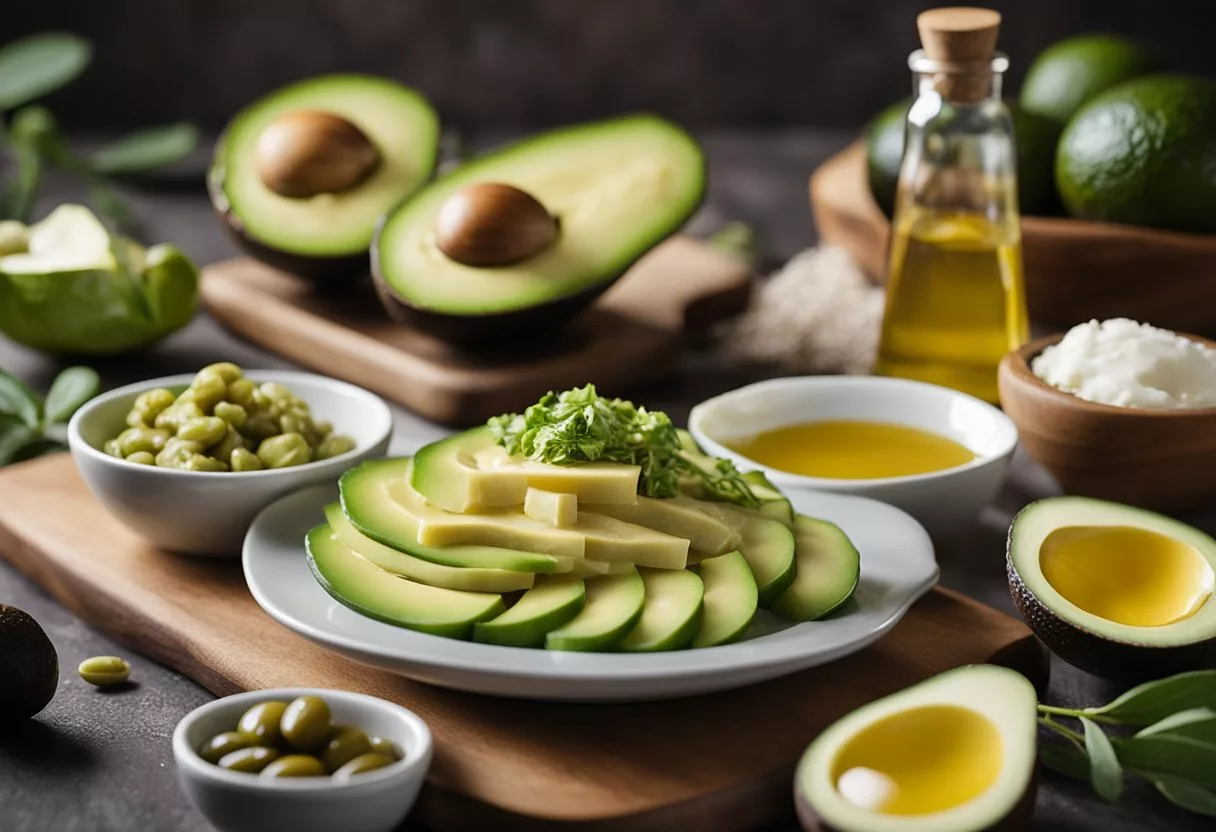
The body requires fats for energy, cellular function, and the absorption of certain vitamins. The type of fat consumed is pivotal for health, particularly concerning metabolic processes like those in a ketogenic diet.
Saturated vs Unsaturated Fat
Saturated fat is found in animal products and some plant oils; it is typically solid at room temperature. While once linked to an increased heart disease risk, newer studies show that moderation is key. Unsaturated fats, which are usually liquid at room temperature, are deemed healthier. These are split into:
- Monounsaturated fats: Found in olive oil and avocados, they are known to help reduce bad cholesterol levels.
- Polyunsaturated fats: They are essential fats, found in fish and seeds, including important fatty acids like omega-3 and omega-6.
Importance of Omega-3 and Omega-6 Balance
A balance between omega-3 and omega-6 fatty acids is crucial:
- Omega-3s are anti-inflammatory and can be found in fatty fish, like salmon, and flaxseeds. They play a vital role in heart and brain health.
- Omega-6s, primarily available in vegetable oils and processed foods, are pro-inflammatory in excess.
Excessive omega-6 intake can lead to an imbalance that may promote chronic diseases. They must consume these fatty acids in a balanced ratio to support bodily functions and minimize heart disease risk.
Healthy Fat Sources for Keto
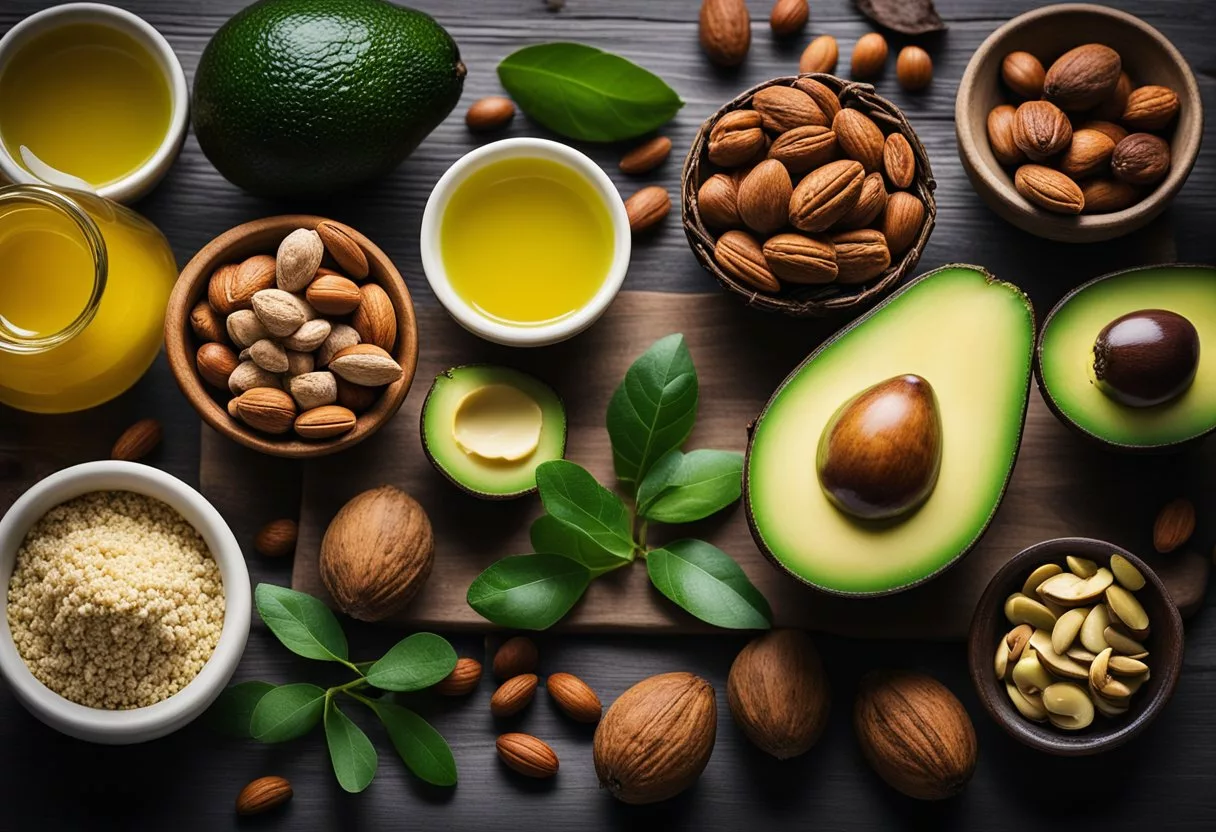
For individuals on a ketogenic diet, selecting the right fat sources is critical for maintaining overall health while still enjoying the benefits of this high-fat, low-carb lifestyle. The focus here is on including healthy fats that not only help in reaching ketosis but also support long-term health.
Animal-Based Fats
Animal-derived fats are a vital component of the ketogenic diet, providing satiety and necessary fatty acids.
Butter and Ghee: These are concentrated sources of fat with minimal lactose, making them suitable for those on keto. They are preferred for their rich flavor and cooking properties.
Dairy: Full-fat dairy options like cheese and Greek yogurt are excellent for their high fat and protein content. Care should be taken to choose varieties low in carbs.
Eggs: Eggs are an essential part of keto, offering not just high-quality fats but also a complete profile of amino acids.
Fatty Fish: Options like salmon, mackerel, sardines, anchovies, and tuna are not just packed with healthy omega-3 fatty acids but are also low in carbohydrates.
Red Meat and Poultry: These are good sources of saturated fats. Selecting grass-fed and organic varieties when possible ensures higher quality fat intake.
Plant-Based Fats
Plant-based fats are equally important and provide a diverse range of lipid profiles that can enhance a ketogenic diet.
Olive Oil: This is a staple in keto for its monounsaturated fats and beneficial polyphenols. Ideally, it should be extra virgin and cold-pressed.
Coconut Oil: Rich in medium-chain triglycerides (MCTs), coconut oil is known to support ketone production and can be used in cooking or as a dietary supplement.
Avocado and Avocado Oil: These are high in monounsaturated fats and contain vital minerals and fiber, which can be a nutritious addition to meals.
Nuts and Seeds: Almonds, macadamias, chia seeds, and flaxseeds offer healthy fats along with a substantial fiber content and various micronutrients.
Each of these food items contributes to the fatty acid profile required to achieve and sustain a state of ketosis, making them integral to a well-formulated ketogenic diet.
Incorporating Healthy Fats into a Keto Diet
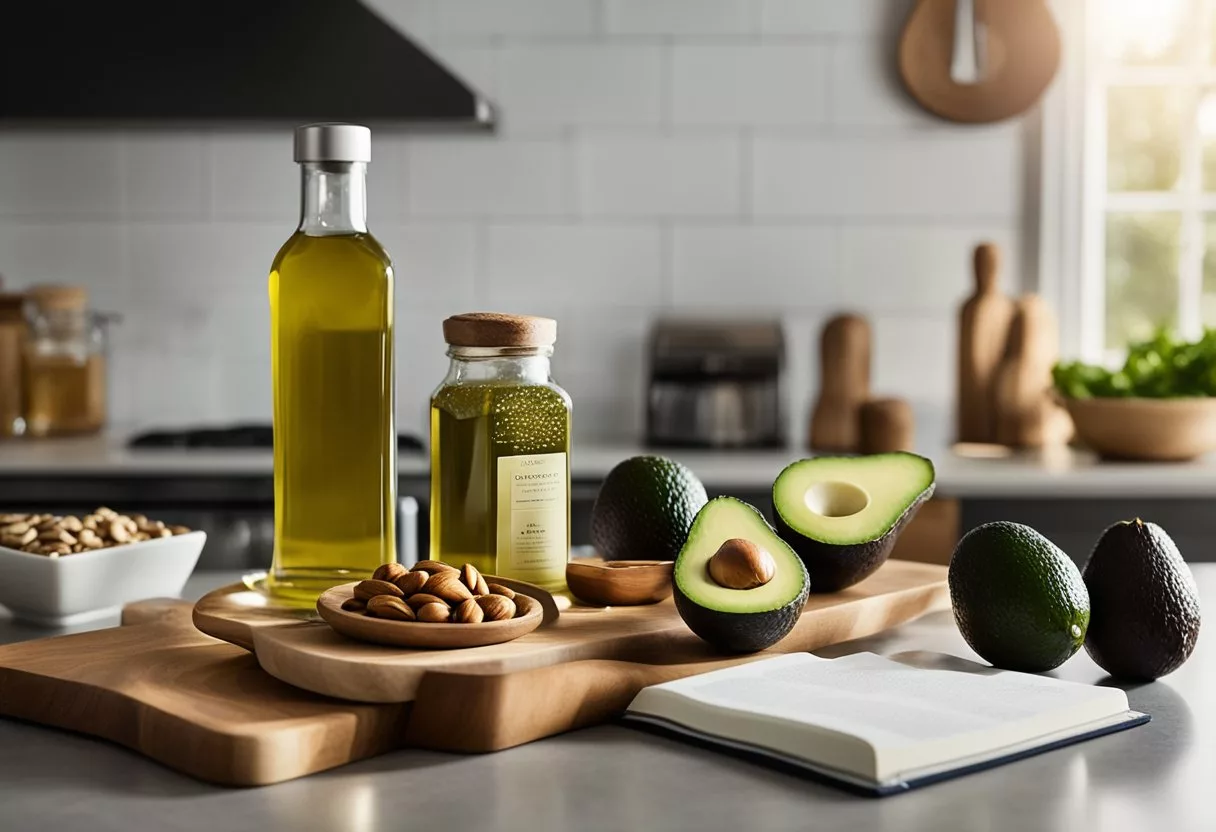
In a ketogenic diet, selecting the right fats and learning how to utilize them in meals are crucial for both nutritional benefits and successful weight loss. Here is how to integrate healthy fats into your keto routine effectively.
Cooking with Healthy Fats
When preparing meals, choosing high-quality oils that remain stable at high temperatures is essential. Avocado oil and extra virgin olive oil are two excellent choices due to their high monounsaturated fat content and health benefits. Coconut oil and butter, especially from grass-fed sources, can also be utilized in cooking to add rich flavor and essential fatty acids.
- Avocado oil: High smoke point, ideal for frying and baking.
- Extra virgin olive oil: Best used at low to medium heat or in cold dishes to preserve nutrients.
- Coconut oil: Versatile in both sweet and savory recipes.
- Butter: Can be used for sautéing or as a base for creamy sauces.
Keto-Friendly Recipes
Incorporating fats into keto recipes can enhance both taste and nutrition. For example, use olive oil-based dressings on salads or drizzle over cooked vegetables to boost fat intake. Flax and chia seeds can be added to keto breads or morning smoothies for a fiber-rich, fatty acid boost. Here are some specific ideas:
- Salads with olive oil dressing or avocado slices.
- Chia or flax seed keto bread.
- Fish recipes that naturally contain high levels of omega-3 fatty acids.
Snacks and Meal Ideas
Snacks and meals on a keto diet should be rich in healthy fats while also providing protein and essential nutrients.
For snacks, consider:
- Nuts such as almonds or walnuts—packed with heart-healthy fats.
- Seeds like pumpkin seeds for a quick protein-fat combo.
- Nut butters with celery sticks for a satisfying crunch.
Meal ideas include:
- Stir-fry using coconut or avocado oil.
- Avocado or olive based sauces, which pair well with proteins like fish or chicken.
- Full-fat cream added to coffee or used in soups for a rich texture.
By prioritizing healthy fats such as avocado oil, olive oil, and nuts and integrating them mindfully into your diet, you can adhere to keto dietary guidelines and support your weight loss objectives effectively.
Monitoring Your Fat Intake
When embarking on a ketogenic diet, one must meticulously manage fat intake to ensure it aligns with their overall dietary goals and maintains a state of ketosis. This involves calculating macronutrient ratios and understanding the role of net carbs.
Calculating Macros
A ketogenic diet typically involves consuming a high percentage of calories from fat, moderate protein, and very few carbohydrates. To achieve weight loss and enter ketosis, one’s calorie intake from macronutrients should be approximately as follows:
- 70-80% from fats
- 20-25% from proteins
- 5-10% from carbohydrates
To calculate one’s fat intake, they must first determine their daily calorie needs. Then, they can apply the aforementioned percentages to calculate the grams of fat they should consume. An individual should also monitor triglyceride levels as high intake of certain fats may impact heart health. Monitoring involves not just keeping track of fats but understanding the quality and source of fats consumed.
Understanding Net Carbs
Net carbs are total carbohydrates minus fiber. They are important in the ketogenic diet because fiber does not significantly impact blood sugar levels; hence, it doesn’t disrupt ketosis.
Here’s how to calculate net carbs:
- Look at the nutrition label for the total number of carbohydrates.
- Subtract the dietary fiber from the total carbohydrates to get net carbs.
For instance:
| Total Carbohydrates | Dietary Fiber | Net Carbs |
|---|---|---|
| 20g | 5g | 15g |
By understanding net carbs, individuals can make better dietary choices that prioritize healthy sources of fat and low-carb vegetables, which can contribute to weight loss efforts. It’s crucial for individuals to focus on high fiber foods to mitigate the potential risk of heart disease due to high fat intake.
Health Benefits and Considerations
In pursuing a ketogenic diet for weight loss, one must carefully select fats that support cardiovascular and cerebral health while managing disease risk. Ensuring a harmonious balance of nutritional value is of utmost importance for long-term success and health on the keto diet.
Heart and Brain Health
On a ketogenic diet, heart health can be supported by incorporating monounsaturated fats such as those found in avocados and avocado oil. These fats can help manage cholesterol levels by increasing the high-density lipoprotein (HDL) and reducing low-density lipoprotein (LDL) in the bloodstream. Avocados are also a good source of potassium, which is beneficial for blood pressure regulation. As for brain health, omega-3 fatty acids, specifically docosahexaenoic acid (DHA) and eicosapentaenoic acid (EPA), are crucial. These are mainly found in fatty fish, and they play a critical role in cognitive function and may reduce the risk of cognitive decline.
Reducing Disease Risk
Consuming healthy fats on a ketogenic diet includes not just a focus on weight loss but also the potential to reduce the risk of various diseases. Fats such as omega-3 fatty acids, found in fish and flaxseeds, can lower the risk of heart disease and have anti-inflammatory effects that may help in reducing the incidence of cancer. Alpha-linolenic acid (ALA), a type of omega-3 found in plant sources like walnuts and flaxseeds, should be consumed in moderation to prevent an imbalance with other essential fatty acids.
Nutritional Balance
Achieving nutritional balance on a keto diet entails a varied intake of fats to obtain essential vitamins and minerals. For instance, nuts and seeds can provide vitamin E, an antioxidant that protects cells from oxidative stress. Fatty fish, like salmon, is rich in vitamin D which, together with calcium obtained from leafy greens, supports bone health. Including a variety of fat sources helps also in obtaining minerals like calcium, iron, and antioxidants, reducing the risk of deficiencies that can lead to conditions such as anemia or compromised immune function.
Research and Evidence
A thorough investigation into the role of fats in the ketogenic diet has uncovered associations between fat types and various health outcomes, particularly metabolic changes conducive to weight loss.
Studies on Keto and Fats
Research has consistently shown that for those following a ketogenic diet, the source of dietary fats can influence the degree of weight loss and impact overall health. For instance, studies indicate that monounsaturated and polyunsaturated fats—found in avocados, nuts, and fish—positively affect heart disease risks. Omega-3 fats, specifically, are noted for their anti-inflammatory properties and potential to combat cardiovascular disease.
Conversely, excessive intake of saturated fats and trans fats, often prevalent in processed foods, is linked to negative health impacts, including elevated cholesterol levels and heightened risk of heart disease. It’s important for individuals on a ketogenic diet to limit these types of fats to avoid adverse effects on health.
Analysis of Dietary Fat Research
Analyses of dietary fat research highlight a nuanced understanding of fats in a ketogenic context. Fats like medium-chain triglycerides (MCTs) can facilitate a state of ketosis and have been associated with increased fat oxidation and potential weight loss. MCTs also have a unique metabolic pathway, which leads to less fat storage compared to other fats.
In relation to brain health, a diet rich in healthy fats has been explored for potential protective effects against diseases such as Alzheimer’s, with some studies pointing towards beneficial impacts due to the presence of substances like ketones, which serve as an alternative energy source for brain cells.
Though the ketogenic diet is high-fat, discriminating between different types of fat is crucial as polyunsaturated and monounsaturated fats typically contribute to a healthier lipid profile and lower inflammation, compared to the adverse effects often seen with a high intake of saturated fats and trans fats.
Common Myths and Misconceptions
Many individuals approach the ketogenic diet with misunderstandings about dietary fats. Here, we dispel some common myths:
- Myth 1: Eating More Fat Boosts Ketosis and Weight Loss
While healthy fats are key in a ketogenic diet, consuming them in excess will not necessarily lead to more significant weight loss. Ketosis is about the balance of macronutrients, not just fat intake. - Myth 2: Saturated Fat is Bad for Your Health
Not all saturated fats are detrimental. The body requires some saturated fats for optimal functioning. However, moderation is crucial, and it’s vital to balance them with unsaturated fats. - Myth 3: Fats Can Be Eaten Freely on Keto
Just because a ketogenic diet is high-fat does not mean fats can be consumed without limits. Calories still matter, and overconsumption of fats can stall weight loss. - Myth 4: Cholesterol Levels Will Skyrocket
Research indicates that a ketogenic diet can improve cholesterol numbers by increasing HDL (good cholesterol) and reducing LDL particle number. - Myth 5: All Fats Are Created Equal
Fats differ in their molecular structure and impact on health. Trans fats, for example, are considered harmful and linked to heart disease, while omega-3 fatty acids are beneficial and associated with a lower risk of heart issues. - Myth 6: Keto Completely Eliminates the Risk of Heart Disease
A ketogenic diet can improve many markers associated with heart disease, but it does not make one immune to it. Other lifestyle factors and genetics play roles.
Incorporating a variety of healthy fats—such as omega-3s found in fish and fiber-rich fat sources like chia seeds—is essential for nutritional balance on a keto diet. Monitoring overall calorie and nutrition intake ensures that a ketogenic lifestyle supports weight loss and health goals.
Optimizing Keto for Long-Term Health
The ketogenic diet is not just a short-term solution for weight loss but can be adapted for sustainable health benefits. Achieving this requires careful selection of food sources and consideration of overall lifestyle changes.
Sustainable Keto Practices
Food Selection is crucial for maintaining heart health on a keto diet. Incorporating healthy fats from sources like fatty fish, olive oil, and nuts is essential. They should look for options such as:
- Fatty fish: Salmon, mackerel, and sardines are rich in omega-3 fatty acids.
- Oils: Olive oil and avocado oil offer monounsaturated fats.
- Nuts and Seeds: Almonds, walnuts, flaxseeds, and chia seeds provide both healthy fats and fiber.
Dairy products, such as full-fat Greek yogurt, can be included in moderation due to their high protein and mineral content; however, they must be cautious of high saturated fat content in certain dairy products.
Individuals should ensure a consistent intake of minerals and fiber, often neglected on strict low-carb diets. Adequate vegetables—like leafy greens and cruciferous varieties—will support micronutrient levels and facilitate digestion.
Lifestyle and Diet Adjustments
Adopting a lifestyle that complements the keto diet enhances weight loss and health outcomes. This includes:
- Regular physical activity
- Stress management techniques
- Adequate sleep
Moreover, they should consider periodic adjustments to their diet to prevent potential deficiencies. Transitioning to a more flexible low-carb diet after achieving weight loss goals can aid in maintaining heart health and overall wellbeing. Such a diet would still prioritize healthy fats while allowing for a greater variety of foods, including:
- Increased carbohydrate intake from nutrient-dense sources like fruits and starchy vegetables.
- Incorporation of a broader range of fiber-rich foods to support gut health.
In essence, an optimized keto approach focuses on sustainability, aligning food choices with necessary lifestyle habits for long-term health maintenance.
Frequently Asked Questions
In this section, readers will find answers to common inquiries regarding the incorporation of healthy fats into a ketogenic diet, tailored for optimal weight loss and health benefits.
What are some high-fat, no-carb foods suitable for a ketogenic diet?
High-fat, no-carb foods ideal for a ketogenic diet include options like avocado oil, butter, and coconut oil. These pure fats are essential for ketosis without adding carbohydrates.
Can you provide a comprehensive list of keto-friendly foods?
A comprehensive list of keto-friendly foods predominantly features fatty meats, oily fish such as salmon, leafy greens, high-fat dairy products, nuts and seeds, avocados, and eggs.
What are the top ten snacks I can enjoy on a keto diet that are high in fat?
The top ten high-fat, keto-friendly snacks one can enjoy include cheese slices, macadamia nuts, olives, dark chocolate (at least 70% cocoa), keto fat bombs, pecans, hard-boiled eggs, full-fat Greek yogurt, almond butter, and pork rinds.
What options do I have for high-fat, low-protein snacks while following a ketogenic diet?
For high-fat, low-protein snacks, one can opt for avocado slices, fat bombs made with coconut oil or butter, macadamia nuts, and be aware that cheese, while higher in protein, is also high in fat.
How much fat should I consume daily on a keto diet to promote weight loss?
The amount of fat required daily on a keto diet varies per individual, but typically, one should aim for fat to make up about 70-80% of their total daily caloric intake to maintain ketosis and promote weight loss.
Is it acceptable to eat a whole avocado on a keto diet, and how does it fit into my macros?
One can eat a whole avocado on a keto diet as it fits into the macros by providing healthy fats, fiber, and very few net carbs, thus supporting ketosis while contributing to fat intake goals.
